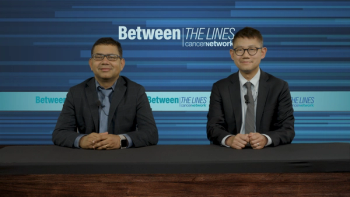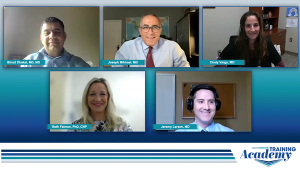Articles by Binod Dhakal, MD, MS

Experts discuss the growing evidence supporting outpatient administration of bispecific antibodies in multiple myeloma, emphasizing the need for multidisciplinary collaboration, patient education, and clear emergency protocols to safely expand this convenient, off-the-shelf treatment approach across disease stages, highlighting that partnerships with experienced centers and gradual implementation strategies are key to successful adoption and improved patient care.

Experts discuss the feasibility and safety of outpatient bispecific antibody treatment for multiple myeloma, emphasizing the importance of careful patient selection, robust support systems, and multidisciplinary collaboration to manage potential complications such as cytokine release syndrome (CRS) and ensure timely care, highlighting that with these measures, outpatient administration can safely expand access while maintaining efficacy and patient convenience.

Experts discuss the significant advancement of outpatient and hybrid dosing strategies for bispecific antibodies such as teclistamab in multiple myeloma, highlighting that with careful patient selection, multidisciplinary support, and proactive monitoring, these approaches maintain efficacy and safety comparable to inpatient care while enhancing patient convenience and expanding access.

Experts discuss new real-world data supporting the safety and effectiveness of outpatient and hybrid step-up dosing of teclistamab in relapsed or refractory multiple myeloma, showing strong response rates, durable disease control, and manageable toxicity and reinforcing the feasibility of administering bispecific therapies beyond inpatient settings and expanding access in community care.

Experts discuss real-world evidence demonstrating that bispecific antibodies such as teclistamab can be safely and effectively administered in community oncology settings using hybrid care models, with robust outcomes even in non–trial-eligible patients and manageable safety profiles that support broader access beyond academic centers.

Experts discuss real-world data showing that teclistamab delivers efficacy and safety outcomes comparable to findings from clinical trials in patients with relapsed/refractory multiple myeloma—including older individuals at high risk—while highlighting the emerging role of shared care models to manage step-up dosing and expand access across community oncology settings.

Experts discuss the transformative impact of T-cell –redirecting therapies in relapsed or refractory multiple myeloma, while highlighting ongoing challenges in optimizing treatment sequencing, managing toxicities, and expanding access—particularly in community settings—to ensure patients can safely and effectively benefit from these novel options.

In relapsed or refractory multiple myeloma, treatment becomes increasingly challenging as patients progress through multiple lines of therapy. With each relapse, response rates diminish and the duration of remission shortens. Although there are several approved drug classes available—including immunomodulatory agents, proteasome inhibitors, and monoclonal antibodies—treatment sequencing is complex and individualized. Many patients become have triple-class– exposed or even penta-refractory disease, limiting the effectiveness of standard options and highlighting the need for innovative therapies and optimized care strategies.
The real-world use of these therapies is often complicated by cumulative toxicities and logistical barriers. For example, immune-based therapies such as bispecific antibodies and CAR -T cells offer promising efficacy but can require hospitalization, intensive monitoring, and specialized infrastructure. In addition, therapies like such as bispecific antibodies may necessitate step-up dosing protocols to mitigate risks such as cytokine release syndrome. These factors can impact affect access and adherence, especially in community settings where supportive care resources may be limited.
As data from ongoing studies and real-world registries accumulate, it becomes increasingly important to close gaps in care for patients with advanced disease. Incorporating novel agents earlier in treatment, managing toxicities more effectively, and improving access to cellular therapies are key goals. Continued collaboration between academic and community providers will be essential to ensure that the growing arsenal of myeloma therapies translates into improved outcomes across all practice settings.

Panelists discuss how patients with multiple myeloma can achieve excellent quality of life with bispecific therapies like talquetamab despite manageable adverse effects, with Karen sharing her advice to embrace treatment opportunities, accept a "new normal," and focus on the meaningful life experiences these innovative therapies enable, including her recent trip to Italy and time with 6 grandchildren she wouldn't have met without these advancing treatments.

Panelists discuss how comprehensive supportive care strategies for GPRC5D bispecifics like talquetamab involve managing unique toxicities including taste and smell changes, skin and nail effects, and gastrointestinal issues, with one patient emphasizing her philosophy of addressing adverse effects as they arise rather than anticipating them, while highlighting the importance of continued research funding for innovative treatments that have extended her survival beyond initial prognosis.

Panelists discuss how the step-up dosing strategy for talquetamab involves graduated dose escalation from 0.01 to 0.06 mg/kg before reaching therapeutic levels to minimize severe cytokine release syndrome, with real-world data showing 85% to 86% of patients can safely receive outpatient step-up dosing, though one patient’s inpatient experience was chosen due to her drug allergies and travel distance considerations.

Panelists discuss how talquetamab demonstrates impressive clinical efficacy with approximately 70% response rates in the pivotal MONUMENTAL-1 trial, including patients previously treated with other immunotherapies, and how real-world data from studies like Real Italy corroborate these trial results with similar 67% response rates across diverse patient populations including high-risk subgroups.

Panelists discuss how clinical decision-making between GPRC5D and BCMA-targeting bispecific antibodies involves considering prior treatment history, target switching strategies, and patient-specific factors, with Karen explaining her preference for talquetamab's targeted approach that spares healthy cells, subcutaneous administration convenience, and the advantage of switching to a different antigen target after previous BCMA therapy.

Panelists discuss how bispecific antibodies like talquetamab work through dual targeting mechanisms that bring T-cells and cancer cells together for tumor destruction, with patient Karen sharing her decision-making process based on treatment convenience, manageable adverse effects like taste loss and nail changes, and the therapy's effectiveness after initial severe reactions during step-up dosing.

Panelists discuss how multiple myeloma patients navigate complex treatment journeys through multiple relapses, clinical trials, and the transformative potential of bispecific antibody therapies like talquetamab, with patient Karen Kehl sharing her 15-year experience from initial diagnosis through 19 treatment cycles including three transplants and various clinical trials.

Panelists discuss how talquetamab’s unique targeting mechanism offers significant advantages for patients with prior T-cell therapy exposure, whereas future research should focus on combination strategies and understanding primary resistance mechanisms.

Panelists discuss how successful outpatient bispecific therapy requires robust infrastructure, including 24-hour monitoring capabilities, emergency department coordination, and liberal use of supportive medications.

Panelists discuss how findings from a Mayo Clinic retrospective study demonstrate the feasibility and safety of outpatient step-up dosing for talquetamab, with minimal hospitalizations required.

Panelists discuss how cytokine release syndrome can be managed through early intervention with tocilizumab and steroids, and emphasize the importance of patient and staff education for safe outpatient administration.

Panelists discuss how talquetamab shows a more favorable safety profile with significantly lower high-grade infection rates compared with B-cell maturation antigen (BCMA)–directed bispecifics, although a new cerebellar toxicity signal requires monitoring.

Panelists discuss how talquetamab demonstrates remarkable efficacy in patients previously exposed to T-cell redirecting (TCR) therapies, with response rates and duration comparable to treatment-naive patients.

Panelists discuss how the extended follow-up data show unprecedented overall survival outcomes, with the every-2-week dosing appearing more tolerable and leading to better long-term outcomes than weekly dosing.

Panelists discuss how talquetamab targets GPRC5D, which is heavily expressed on malignant plasma cells but not normal B cells, potentially explaining lower infection rates compared with B-cell maturation antigen (BCMA)–targeted therapies.

Panelists discuss the unmet need for effective therapies in early-relapse multiple myeloma, where patients have exhausted standard treatments but do not yet qualify for bispecific therapies or CAR T cells.

Life After CAR T: Patient and Clinical Perspectives on the Promise of CAR T in Multiple Myeloma

Panelists discuss how health care centers provide comprehensive long-term monitoring and support services for both patients receiving CAR T and their caregivers in the posttreatment period, including regular medical assessments and ongoing educational resources.

Panelists discuss how patients and medical teams navigate the complex CAR T therapy journey, from initial referral through cell collection, manufacturing, and infusion, while highlighting crucial monitoring strategies for managing adverse effects such as cytokine release syndrome and neurotoxicity.

Panelists discuss how a patient and their medical team collaborated to evaluate the differences between ide-cel and cilta-cel CAR T therapies to make an informed treatment decision.

Panelists discuss how clinical trial data from CARTITUDE-1, CARTITUDE-4, and KarMMa-3 demonstrate the efficacy of CAR T therapies cilta-cel and ide-cel in multiple myeloma, comparing their real-world outcomes and considering patient-specific factors for treatment selection.

Panelists discuss how health care providers engage in vital conversations with patients about CAR T therapy, focusing on comprehensive education, emotional support, and clear communication about the treatment journey ahead.










